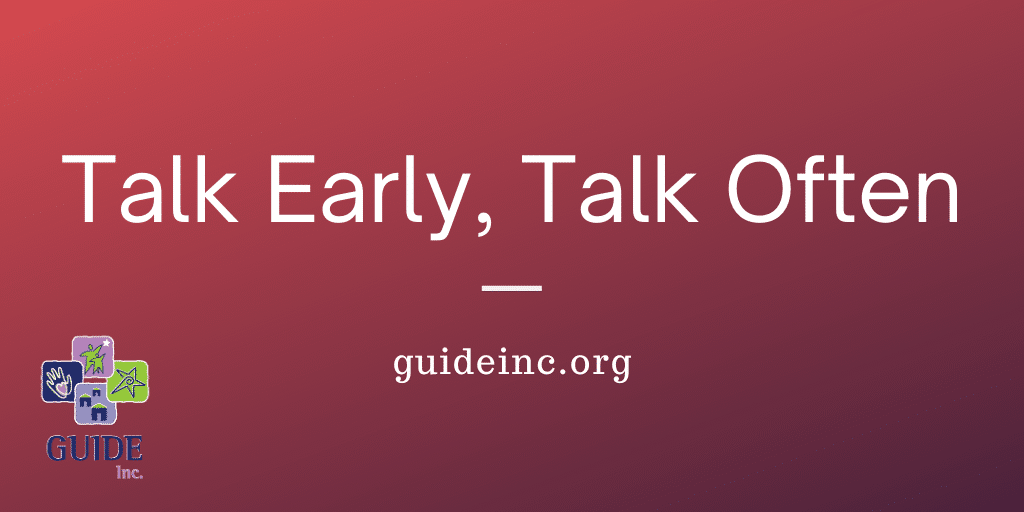Contributed by Aspen Brown

Talking early and often is commonly recommended when referring to youth substance use prevention, but what does it look like in practice?
Talk Early
The toddler years are a prime time to begin having simple conversations on healthy habits. You can begin to lay the foundation for more complex topics as your child ages. For example, when taking a daily vitamin, talk about why your child should only take one a day and not two or three. This is an age-appropriate way to talk about drug misuse. If you drink a beer or glass of wine at the end of the day, talk with them about why adults can have those kinds of drinks and kids shouldn’t. You might say something along the lines of, “Johnny drinks juice because that’s safe for his brain, but wine can hurt his brain.”
Early elementary years are a good time to start working on building resistance skills with your child. Peer pressure situations will likely not involve drugs or alcohol, but your child may be pressured by peers to engage in undesired behaviors. Talk with them about how they can respond in these situations that would lead to positive outcomes. They can practice the “leave” strategy by going to a different part of the playground if kids are pushing each other. Don’t forget to continue the practices that started in the toddler years.
One of the main reasons it is recommended to talk early with your child about drugs and alcohol is that parents and caregivers don’t know the exact time when their child will be offered a beer or be pressured into vaping. Studies show that only 10% of 12-year-olds have tried alcohol, but by age 15, it spikes to 50%.[1] Researchers also know that major transition times, such as elementary to middle school, are high-risk periods for drug abuse among youth.[2] Having intentional conversations with your child regularly before they are ever offered drugs or alcohol can position them to make healthy choices.
At the preteen age, don’t assume that your child knows the different kinds of drugs and why they are bad for them. Ask them open-ended questions like “why do you think teenagers drink alcohol?” Parents and caregivers aren’t expected to have all the answers. If your child asks a question that you don’t know the answer to, research the answer together.
By the time your child is in high school, you may feel like there’s nothing you can do or say that will change their attitude towards drugs and alcohol. This simply isn’t true. A strong and open relationship with a parent can be one of the most influential factors in adolescent decision-making.[3] Conversations will be different than in the toddler years, but keep talking. Natural ways to bring up these conversations can include referencing a news story about teen vaping to ask your child if this is common at their school or asking your child how they would respond if a friend they know who’s been drinking offers them a ride after viewing a beer commercial. With these informal approaches, your teen may be more open to engaging in conversation and hearing your viewpoint.
Talk Often
How frequent is often? The frequency will vary for every child-parent relationship. There may be times when you are discussing drugs every day for weeks with your child because of what’s happening in the news. Other times it might be once a month. Stressing over the frequency of these conversations isn’t recommended. By making talking about drugs and alcohol commonplace in your household, you are opening the door to healthy discussions on a regular basis.
Model Healthy Behaviors
A lot of emphasis is placed on talking early and often with your child about the dangers of drugs and alcohol. Of equal importance is to model healthy behaviors surrounding drugs and alcohol as parents and caregivers. If substance use is something that you struggle with or have struggled with in the past, be honest with your child (within age-appropriate reasons). Talk about why you were tempted to use it and why you don’t want them to go down the same path. Reach out for help if needed. View a full list of resources here.
Tips on Maintaining a Strong Relationship with Your Child
Be involved with what your child is doing both in-person and online. Your child may feel like you are prying into their personal life, so it is important to let them know why you are asking questions. It can also be beneficial to initiate one-on-one time with your child, where you aren’t distracted by other people or your phone.
Being involved also includes knowing who your child’s friends are, their friends’ parents and where they hang out. Ask more specific questions than “how was your day?” Try, “who do you talk to in class…what do your friends do after school…when do your friends’ parents get home during the week?”
When talking with your child about drugs and alcohol, take an open approach. This does not mean to abandon setting clear expectations and making those known, but to allow your child the space to express their thoughts and feelings. Engage in active listening to let your child know that you are listening to what they are saying. If your child shares that they have used drugs or alcohol before, try to remain calm. Avoid judging their actions and talk with them to understand why they chose to use those substances. Depending on the situation, you may need to set new boundaries or seek additional help.
Check out our discussion cards and other materials for quick facts and ways to strike up a healthy conversation with your child.
Sources:
[1] SAMHSA
[2] NIH
[3] National Scientific Council on the Developing Child
 Aspen Brown served as a GUIDE intern during the 2020-2021 school year as a Master of Public Health Graduate Student at Baylor University. Her program specializes in community health to prepare students to serve others and improve quality of life across populations by promoting health and wellness.
Aspen Brown served as a GUIDE intern during the 2020-2021 school year as a Master of Public Health Graduate Student at Baylor University. Her program specializes in community health to prepare students to serve others and improve quality of life across populations by promoting health and wellness.
